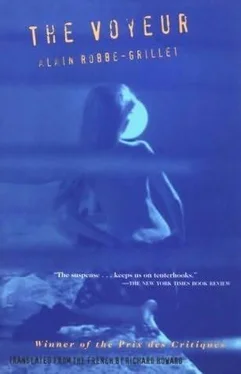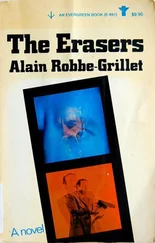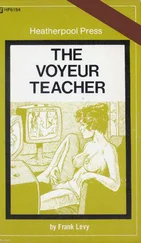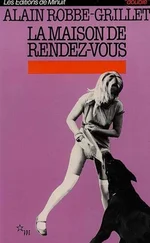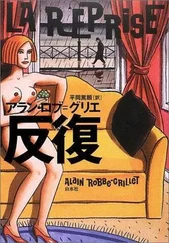But if Julian Marek had not been at the farm, where had he been? Did his father have good reason for supposing him to have run off to the cliff on the way home from the bakery? Suddenly a wave of terror broke over Mathias: Julian, coming by another path—by “the other” path—to meet Violet, from whom he had demanded explanations—against whom, in fact, he harbored enough resentment to desire her death—Julian, catching sight of the salesman, had taken cover and had watched…. Mathias passed his hand over his forehead. Such imaginings did not hold water. His headache had become so violent that he was going out of his mind.
Was it not sheer madness to be ready—suddenly, because of an ordinary gumdrop wrapper—to get rid of young Marek by pushing him over the edge?
Until now Mathias had not taken into account the two little pieces of paper which he had thrown away the day before and which—to his mind, at least—did not constitute actual evidence in the case. He considered it a matter of bad taste that they should be so regarded, since he had not even thought of recovering them; they had seemed so unimportant when he was in a state of composure. Julian himself had just unwrapped one quite casually, demonstrating that nothing could be proved.… All the same, another interpretation…
Another interpretation occurred to him: was this spectacular gesture not meant to show that Julian would keep silent, that the guilty party, once brought to light, would have nothing to fear from him ? His strange attitude back at the farm could have no other explanation. There too he was proclaiming his power over Mathias: he was destroying evidence with the same facility with which he unearthed further indications of guilt, modifying as he chose the content of the hours that had already elapsed. But there would have to be something more than suspicions—even detailed suspicions—to justify such assurance as this. Julian had “seen.” There was no use denying it any longer. Only the images registered by these eyes could have given them such an intolerable fixity.
Yet they were quite ordinary gray eyes—neither ugly nor beautiful, neither large nor small—two perfect, motionless circles set side by side, each one pierced at the center by a black hole.
The salesman had begun talking again to conceal his agitation, rapidly and without a break—unconcerned, moreover, with relevance or even coherence; it did not seem to matter much, since the boy was not listening. Any subject he could think of seemed worth trying: the harbor shops, the length of the crossing, the price of watches, electricity, the sound of the sea, the last two days’ weather, the wind and the sun, the toads and the clouds. He also described how he had missed the return boat, which obliged him to remain on the island for several days; he was spending this compulsory leisure time, until his departure, making visits and taking long walks…. But when he came to a stop, out of breath, desperately casting about for something else to say in order not to repeat himself too much, he heard Julian’s question, asked in the same neutral, even tone of voice: “Why did you go get Jackie’s sweater again if you were only going to throw it into the sea?”
Mathias passed his hand over his forehead. Not “go get the sweater,” but “go get the sweater again”… He began his answer in an almost supplicating tone: “Listen, boy, I didn’t know it was hers. I didn’t know it was anyone’s. I only wanted to see what the gulls would do. You saw them: they thought I was throwing them a fish…”
The young man said nothing. He was looking Mathias straight in the eyes, his own fixed and strange—as if unconscious, even blind—or imbecile.
And Mathias still went on talking, though without the slightest conviction, carried away by the flood of his own words across the deserted moor, across the series of dunes where no trace of vegetation remained, across the rubble and the sand, darkened here and there by a sudden shadow of a specter forcing him to retreat. He went on talking. And the ground, from sentence to sentence, gave way a little more beneath his feet.
He had come out here on one of his strolls, following the paths wherever they led, for no other reason than to stretch his legs a little. He had noticed a piece of cloth hanging from the rocks. Having climbed down to have a look, out of sheer curiosity, he had decided it was merely an old rag of no possible use (but Julian was doubtless aware of the gray sweater’s excellent condition…) and had unthinkingly thrown it to the gulls to see what they would do. How could he have known that this rag, tills dirty piece of wool (on the contrary, extremely clean)—this object, really—belonged to little Jacqueline? He didn’t even know this was the place she had fallen… fallen… fallen.… He stopped. Julian was looking at him. Julian was going to say: “She didn’t fall, either.” But the boy did not open his mouth.
The salesman resumed his monologue still more rapidly. It was no easy matter to climb down the rocks, especially wearing such big shoes. Toward the top the ground might easily cave in under his feet. Yet he hadn’t suspected it was so dangerous; otherwise he would not even have tried. Since he didn’t know this was the place…. But no one had said any such thing; the fact that the sweater belonged to Jacqueline did not mean the accident had occurred here. Just now, in the matter of the gumdrop wrapper, Mathias had already given himself away, admitting he knew the exact spot where the girl tended her sheep. Too late, now, to go back…. He couldn’t suppose, in any case, given the position of the sweater, that it had been torn off in the course of her fall… etc.
“That’s not it, either,” said Julian.
Mathias was seized with panic and hurried on, too apprehensive for explanations. He began to speak at such a rate that objections—or even regret at his own words—became utterly impossible. In order to fill in the blanks, he often repeated the same sentence several times. He even caught himself reciting the multiplication table. Seized with a sudden inspiration, he fumbled in his pocket and brought out the little gold-plated wrist watch: “Here, since it’s your birthday I’m going to give you a present: look at this fine watch!”
But Julian, his eyes still fixed on Mathias’, retreated farther and farther into the grassy hollow, away from the edge of the cliff toward the curve of the horseshoe. Lest the boy run away even faster, the salesman dared not make the least move in his direction. He stood where he was, holding in his outstretched hand the watch with its band of metal links, as if he were trying to tame birds.
When he reached the foot of the slope bordering the inner limit of the horseshoe, the young man stopped, his eyes still fixed on Mathias’—who was equally motionless, twenty yards away.
“My grandmother will give me a finer one,” he said.
Then he thrust his hand into his work-clothes and brought out a handful of miscellaneous fragments, among which the salesman recognized a thick cord spotted with grease; it seemed washed out or discolored, as if by prolonged immersion in sea water. The other things were hard to see at this distance. Julian picked out a cigarette butt—already three-quarters smoked—and put it between his lips. The little cord and the other articles went back into his pocket. He buttoned his jacket again.
Keeping the butt in the right corner of his mouth—without lighting it—and his glassy eyes on the salesman, the boy waited, his face pale; the brim of his cap was tilted slightly toward his left ear. Mathias lowered his eyes first.
“You rented the new bicycle from the tobacco shop,” the voice said next. “I know that bike. There’s no tool bag under the seat. The tools are in a box behind the luggage rack.” Of course. The salesman had noticed it right away the day before: a chromium-plated, rectangular box—one of the permanent accessories; on its rear surface was the red reflector, usually attached to the mudguard. Of course.
Читать дальше
